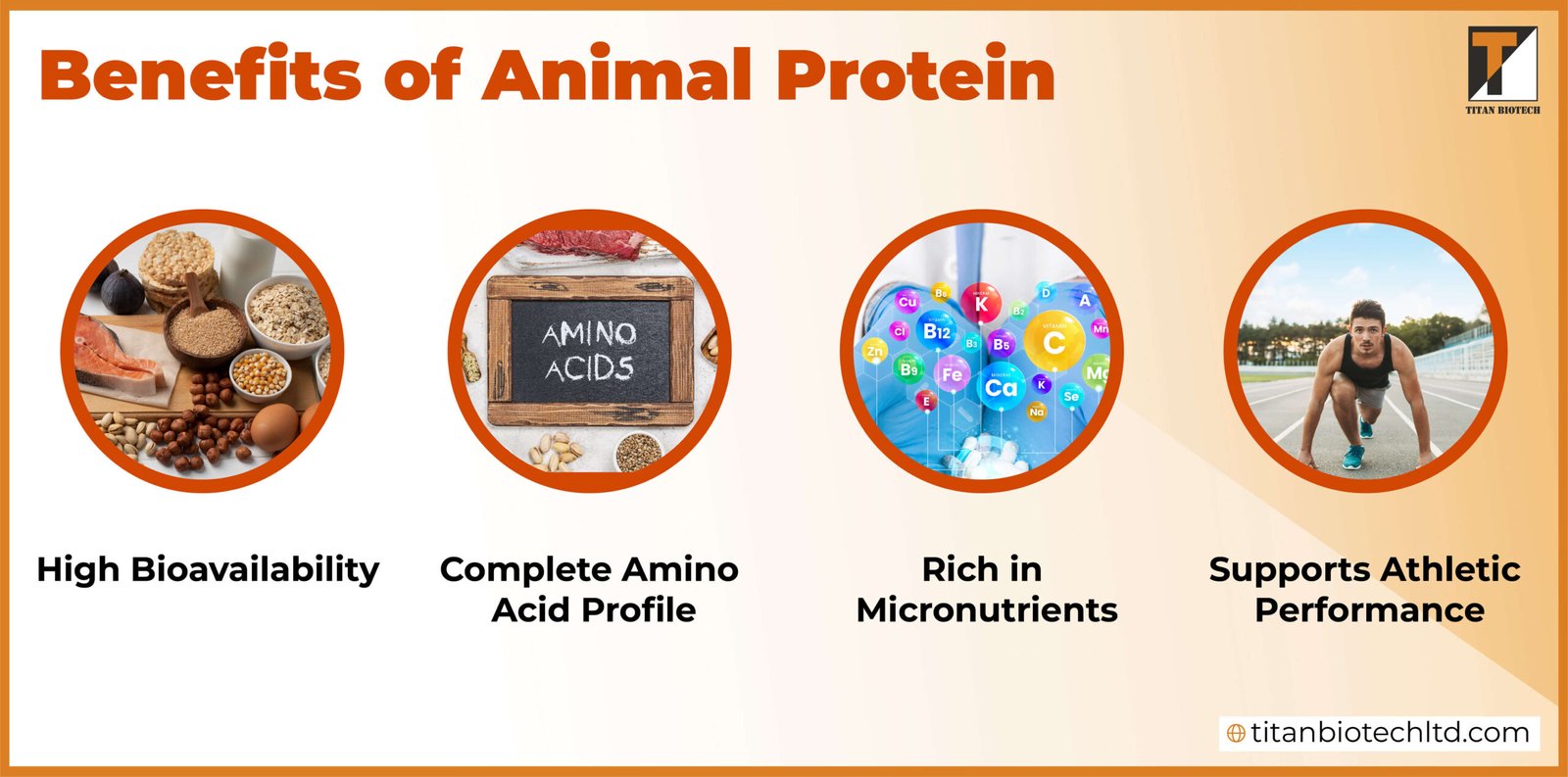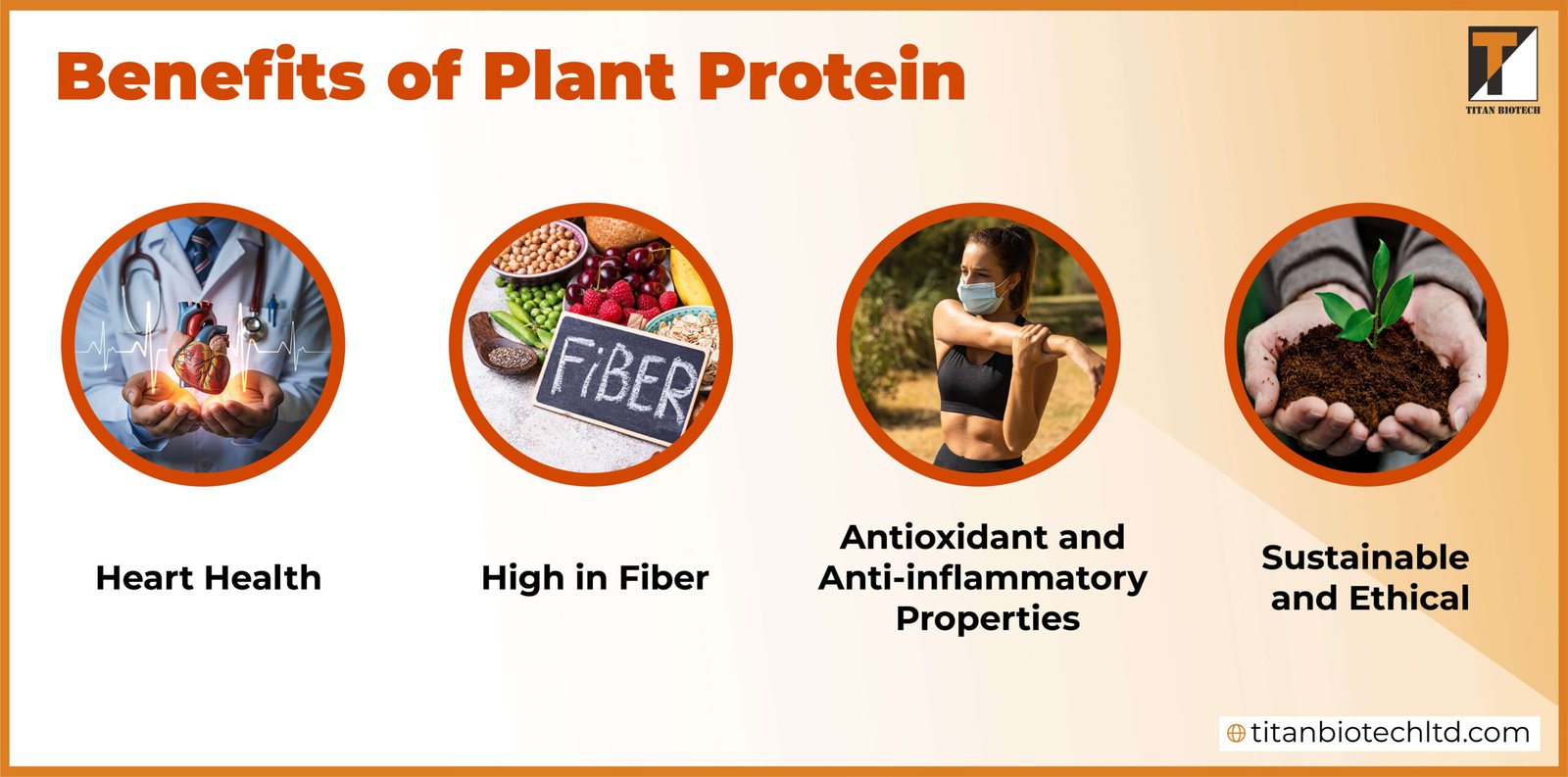Table of Content
- Nutritional Profiles
- Benefits of Animal Protein
- Benefits of Plant Protein
- Health Impacts
- Environmental and Ethical Considerations
- Practical Considerations
- Which Should You Choose?
- Conclusion
- References
Protein is a cornerstone of a healthy diet, vital for building and repairing tissues, producing enzymes and hormones, and supporting overall bodily functions. The source of your protein, whether animal or plant, can significantly impact your health, performance, and even the environment.
Animal proteins, derived from meat, poultry, fish, eggs, and dairy, are known for their rich nutrient profiles and high bioavailability. Plant proteins, sourced from legumes, nuts, seeds, grains, and vegetables, offer unique benefits like fibre and antioxidants while being more sustainable.
The debate over which is better has sparked extensive research and discussion. This blog delves into the characteristics, benefits, health impacts, environmental considerations, and practical aspects of animal and plant proteins, supported by clinical studies, to help you decide which is best for you.
Nutritional Profiles
Animal Protein
Animal proteins, derived from sources like meat, poultry, fish, eggs, and dairy, are considered complete proteins because they contain all nine essential amino acids in adequate amounts. For example, whey protein from dairy is rich in leucine, a key amino acid for muscle protein synthesis.
- Study Reference: A 2015 study published in The American Journal of Clinical Nutrition found that whey protein supplementation significantly increased muscle mass and strength in resistance-trained individuals compared to a placebo.
Animal proteins also provide micronutrients like vitamin B12, heme iron, and zinc, which are less abundant or absent in plant-based foods. However, they can be high in saturated fats and cholesterol, which may pose risks if consumed excessively.
Plant Protein
Plant proteins come from sources like legumes, nuts, seeds, grains, and vegetables. While most plant proteins are incomplete (lacking one or more essential amino acids), combining different sources (e.g., rice and beans) can create a complete amino acid profile.
- Study Reference: A 2017 study in The Journal of Nutrition demonstrated that a combination of plant proteins (e.g., soy and pea) could support muscle protein synthesis comparably to animal proteins when consumed in adequate amounts.
Plant proteins are often rich in fibre, antioxidants, and phytochemicals, which contribute to heart health and reduced inflammation. However, they may require larger portions to meet protein needs due to lower protein density.
Benefits of Animal Protein

- High Bioavailability– Animal proteins are easily digested and absorbed, providing efficient delivery of amino acids for muscle repair and growth.
- Study Reference: A 2016 study in Nutrients found that animal proteins like whey and casein have higher digestibility scores than most plant proteins, leading to better amino acid uptake.
- Complete Amino Acid Profile– All essential amino acids are present in optimal ratios, making them ideal for muscle building and recovery.
- Rich in Micronutrients– Animal proteins provide critical nutrients like vitamin B12, heme iron, and omega-3 fatty acids (from fish), which are vital for energy, brain health, and oxygen transport.
- Supports Athletic Performance– High leucine content in animal proteins, especially whey, promotes muscle protein synthesis, benefiting athletes and those engaging in resistance training.
- Study Reference: A 2018 meta-analysis in The British Journal of Sports Medicine confirmed that animal-based protein supplements were more effective for increasing lean muscle mass.
Benefits of Plant Protein

- Heart Health– Plant proteins are low in saturated fat and cholesterol-free, reducing the risk of cardiovascular diseases.
- Study Reference: A 2020 study in JAMA Internal Medicine found that higher plant protein intake was associated with a 10% lower risk of all-cause mortality, particularly from heart disease.
- High in Fiber– Plant proteins, found in beans, lentils, and whole grains, are rich in dietary fiber, which supports digestion, blood sugar control, and gut health.
- Antioxidant and Anti-inflammatory Properties– Plant proteins often come with phytochemicals and antioxidants, which reduce inflammation and protect against chronic diseases like cancer and diabetes.
- Study Reference: A 2019 study in Nutrients showed that plant-based diets rich in legumes and nuts reduced markers of inflammation.
- Sustainable and Ethical– Plant proteins have a lower environmental footprint and align with ethical concerns about animal welfare, making them a preferred choice for eco-conscious individuals.
Health Impacts
Animal Protein and Health
Animal proteins are highly bioavailable, making them particularly effective for muscle repair and growth, which is why they are popular among athletes. However, excessive red and processed meat consumption has been linked to increased risks of cardiovascular disease and certain cancers.
- Study Reference: A 2019 study in The Lancet found that high red meat intake was associated with a 7% increased risk of mortality from cardiovascular diseases.
Plant Protein and Health
Plant proteins are associated with lower risks of chronic diseases due to their fibre content and lack of cholesterol. They are often recommended for heart health and longevity. However, plant-based diets may require careful planning to avoid deficiencies in nutrients like vitamin B12, iron, and omega-3 fatty acids.
Environmental and Ethical Considerations
Animal protein production, particularly beef, has a significant environmental footprint, contributing to greenhouse gas emissions, deforestation, and water use.
- Study Reference: A 2018 report in Science highlighted that livestock farming accounts for approximately 14.5% of global greenhouse gas emissions, with beef being a major contributor.
Plant protein production generally has a lower environmental impact, requiring less land, water, and energy. Additionally, ethical concerns about animal welfare drive many to choose plant-based proteins.
Practical Considerations
- Animal Protein– Convenient for high-protein diets, especially for athletes or those with high protein needs. However, cost and preparation time (e.g., cooking meat) can be barriers. Processed meats are convenient but often high in sodium and preservatives.
- Plant Protein– More affordable and sustainable but may require combining multiple sources to achieve a complete amino acid profile. Plant-based protein powders (e.g., pea, rice) offer convenience but may be less palatable for some.
Which Should You Choose?
The choice between animal and plant protein depends on your health goals, dietary preferences, and ethical values:
Choose Animal Protein If:
- You prioritize muscle growth and recovery (e.g., athletes).
- You need a convenient, bioavailable protein source.
- You have no dietary restrictions or ethical concerns about animal products.
Choose Plant Protein If:
- You aim to reduce chronic disease risk or follow a heart-healthy diet.
- You prioritize environmental sustainability or animal welfare.
- You have dietary restrictions (e.g., vegetarian, vegan).
A balanced approach, incorporating both animal and plant proteins, may be ideal for many people. For example, reducing red meat intake while including fish, eggs, legumes, and nuts can provide nutritional benefits while addressing environmental concerns.
- Study Reference: A 2021 study in The American Journal of Clinical Nutrition found that a flexitarian diet (combining plant-based foods with moderate animal protein intake) improved metabolic health markers compared to a standard omnivorous diet (Kim et al., 2021).
Conclusion
Both animal and plant proteins offer distinct benefits. Animal proteins provide high bioavailability, complete amino acid profiles, and essential micronutrients, making them ideal for muscle building and athletic performance. Plant proteins excel in promoting heart health, reducing inflammation, and supporting sustainability. By understanding your priorities and incorporating a variety of protein sources, you can optimize your diet for health, performance, and environmental impact.
References
- Gorissen, S. H., et al. (2017). Protein content and amino acid composition of commercially available plant-based protein isolates. The Journal of Nutrition, 147(12), 2163-2172.
- Huang, J., et al. (2020). Association between plant and animal protein intake and overall and cause-specific mortality. JAMA Internal Medicine, 180(9), 1173-1184.
- Kim, H., et al. (2021). A flexitarian diet improves metabolic health in overweight adults: A randomized controlled trial. The American Journal of Clinical Nutrition, 114(3), 1089-1098.
- Menzel, J., et al. (2019). Associations between a plant-based diet and inflammatory biomarkers. Nutrients, 11(7), 1548.
- Morton, R. W., et al. (2018). A systematic review, meta-analysis, and meta-regression of the effect of protein supplementation on resistance training-induced gains in muscle mass and strength in healthy adults. British Journal of Sports Medicine, 52(6), 376-384.
- Poore, J., & Nemecek, T. (2018). Reducing food’s environmental impacts through producers and consumers. Science, 360(6392), 987-992.
- Rutherfurd, S. M., et al. (2016). Protein digestibility-corrected amino acid scores and digestible indispensable amino acid scores differentially describe protein quality in humans. Nutrients, 8(3), 129.
- Volek, J. S., et al. (2015). Whey protein supplementation during resistance training augments lean body mass. The American Journal of Clinical Nutrition, 101(4), 711-719.
- Zheng, Y., et al. (2019). Association of red meat consumption with mortality: A systematic review and meta-analysis. The Lancet, 394(10200), 1011-1021.

